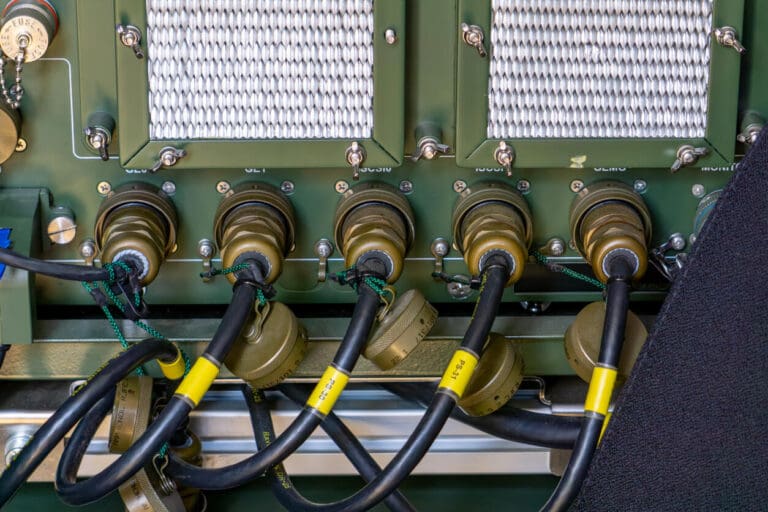
What Does JOSCAR Certification Mean for a Defence Cable Manufacturer?
When you buy mil-spec cable assemblies for rail projects, you are choosing more than a...
Read MoreControl panel builders play an essential role in ensuring that electrical systems operate safely and efficiently across a wide range of applications. Acting as the central hub for managing and distributing power, control panels are critical in both industrial and commercial environments. To maintain high safety standards and optimise performance, control panels must be designed with precision and care.
In this blog, we’ll explore how control panel builders ensure both safety and efficiency, highlighting the key methods they use to maintain these high standards.
One of the most significant advantages of working with a professional control panel builder is the ability to create custom panels tailored to the specific requirements of a project. Unlike generic solutions, custom control panels are designed to meet the exact operational demands of the electrical system they support. This ensures suitability for the application and enhances performance by eliminating unnecessary components or functions.
For example, a custom-designed control panel can incorporate safety features specific to its environment, such as high humidity or extreme temperature fluctuations. This careful design process improves safety while ensuring the panel operates efficiently.
Control panel builders play a key role in ensuring that electrical systems comply with industry safety standards and regulations. Safety is a critical aspect of any electrical system, and failing to meet compliance requirements can lead to serious issues such as electrical failures or even hazards to personnel.
Professional control panel builders work to ensure that their products meet all relevant safety standards, including those set by organisations like IEC and UL. By adhering to these regulations, they help prevent electrical faults, short circuits, and other issues that could compromise the safety of the system. Additionally, control panel builders often incorporate additional safety measures, such as surge protection, enhanced insulation, and built-in circuit breakers, to further protect against potential hazards.
Efficiency in control panel design goes beyond the components used; it also involves how those components are arranged within the panel. An efficient layout ensures that the system can be installed, maintained, and upgraded with minimal difficulty. Control panel builders take great care to arrange components in a way that allows for easy access, logical wiring paths, and clear labelling.
This attention to detail can significantly reduce the time spent on installation and maintenance. For example, when components are logically placed and labelled, technicians can easily identify and address any issues that arise, avoiding downtime and costly delays. Moreover, a well-designed panel reduces the risk of human error during maintenance, further contributing to the overall safety and efficiency of the system.
The reliability of a control panel depends largely on the quality of its components. Control panel builders source high-quality materials and parts to ensure the longevity and durability of the system. By choosing components that are built to last, control panel builders help minimise the risk of system failure, reducing both downtime and maintenance costs.
Using high-quality components contributes to the energy efficiency of the system. For instance, modern control panels often include energy-saving features, such as variable frequency drives (VFDs), which allow for better control over motor speeds and reduce overall power consumption. These components enhance system efficiency while providing long-term cost savings for businesses.
Control panels generate a significant amount of heat, especially in industrial environments where they are responsible for managing large electrical loads. Overheating can lead to malfunctions, component failures, and even dangerous electrical fires. Control panel builders take this into account by designing systems with adequate ventilation and temperature control.
Ventilation systems, such as cooling fans and air filters, are often integrated into the panel to maintain a stable temperature. In more extreme environments, control panel builders might recommend air conditioning or heat exchangers to regulate the temperature within the panel, ensuring all components function within their optimal operating range. Proper temperature management improves the performance of the control panel and extends the life of its components.
A well-built control panel isn’t just about initial performance; it’s also designed to support long-term maintenance and future upgrades. Control panel builders understand that systems often need to evolve over time to meet new operational demands or incorporate updated technology. As such, they design panels with modularity in mind, allowing for easy integration of new components without requiring a complete overhaul.
By planning for future expansion, control panel builders make it easier for businesses to stay agile and adapt to changing needs. This foresight helps reduce the costs and complexity associated with upgrading electrical systems, ensuring that they remain efficient and effective well into the future.
Control panel builders provide much more than just the hardware that powers electrical systems. Through careful design, adherence to safety standards, and the use of high-quality components, they ensure that electrical systems are both safe and efficient. Their role is critical in optimising system performance, reducing energy costs, and ensuring long-term reliability.
If you’re looking to enhance the safety and efficiency of your electrical systems, working with an experienced control panel builder is essential. Let’s discuss how a customised solution can meet your project’s unique requirements, delivering the performance and reliability you need.

When you buy mil-spec cable assemblies for rail projects, you are choosing more than a...
Read More
In practice, defence standard cable solves a large share of wiring-driven reliability issues in modern...
Read More
Unmanned systems now underpin many defence programmes, with air, land and maritime platforms providing surveillance,...
Read MoreReady to talk cables, fibre or full network solutions? Get in touch with our team today, we’re here to help.